Spoilers abound.
You know, I’m usually a giant pessimist about everything, but for some insane reason I keep coming back to big blockbusters like these expecting a little microcosm of wonder to open up in my otherwise black hole of a heart. By now, I should just accept that I will never again experience the joy of watching Jurassic Park and that I will die alone surrounded by empty boxes of Milk Duds.
HOWEVER! I went and saw Interstellar ANYWAY, like a good consumer, and I return to you 17 dollars poorer to report on how terrible and disappointing it was.
I haven’t quite decided whether Christopher Nolan’s space epic was more disappointing than The Dark Knight Rises; I’m going to say it was less disappointing, because I didn’t invest several years waiting for it come out. I’m pretty sure it’s less disappointing than Star Wars: The Force Awakens will be—as a matter of principle—so there’s that to take as a consolation.
Here’s a quick spoiler-filled summary of the movie: In the future, everyone is a starving farmer because something called “the blight” destroyed all our food, except for all the farmers who are secretly astronauts. Cooper (Matthew McConaughey) is such a guy. His annoying daughter Murphy (Jessica Chastain) finds this annoying poltergeist (who is actually Cooper FROM THE FUTURE! Spooooky!) and it reveals the coordinates to NASA, which somehow, despite being disbanded and de-funded after the military collapsed as a result of the whole ecological disaster, found an enormous amount of resources to build twelve space capsules to send through an artificial wormhole near Saturn believed to be created by benevolent Five Dimensional Aliens with the lofty intentions to locate a new planet for humans to colonize. Professor Brand (Michael Caine), lead scientist with a penchant for quoting the same goddamned Dylan Thomas poem over and over, is trying to solve a mysterious “gravity equation” that will allow humanity to leave the planet in an anti-gravity spaceship? Once we know where to put humanity? I guess? In the meantime, he sends his daughter Amelia Brand (Anne Hathaway) on a spaceship with Cooper through the wormhole to confirm which of the planets (it turns out only three are viable) is the best for colonization. Long story short: lots of space shenanigans ensue, everyone dies except Cooper and Amelia, Matt Damon pops up as a villain who really likes droll monologues, there’s a black hole, and lots of time dilation.
I’m already exhausted just summarizing.
If Interstellar were a children’s book, it would probably be entitled:
- “Anne Hathaway’s Psychedelic Love Diary”
- “The Time Dilation Coloring Book”
- “Surprise! It’s Matt Damon!”
- “Goodnight Michael Caine”
- “True Detective in Space”
I have three big gripes about the movie, in descending order of gripery: First, Interstellar uses some of the same narrative tricks that Memento, Following, and The Prestige use to stir up mystery, but mercilessly explains them all away; like the blockbuster of ultimate compromise, the film balances a presentation of the mystery of the unknown with an immediate explainer for any science-dumb audiencegoers. My second biggest gripe about Interstellar is how spaghettified (woo! black hole pun) my suspension of disbelief becomes despite how faithfully the Nolans stuck to “the science” in teaming up with theoretical physicist Kipp Thorne to engineer the movie. On that front, at least for me, it’s not so much wild liberties being taken with what’s possible, but wild liberties being taken with what’s plausible, from a narrative point of view. Finally, my biggest gripe with the film is its overwrought, hamfisted attempts at profundity. Interstellar is reaching for something spiritual underneath all the special effects and grandiose dialogue and Hans Zimmer bass, but it still falls flat. A day after seeing the film, I struggled to understand exactly why, and so I thought back to the last time I saw a scifi that really struck a “spiritual” chord for me. Incidentally, it’s a movie that shares Matthew McConaughey in a leading role: Contact.
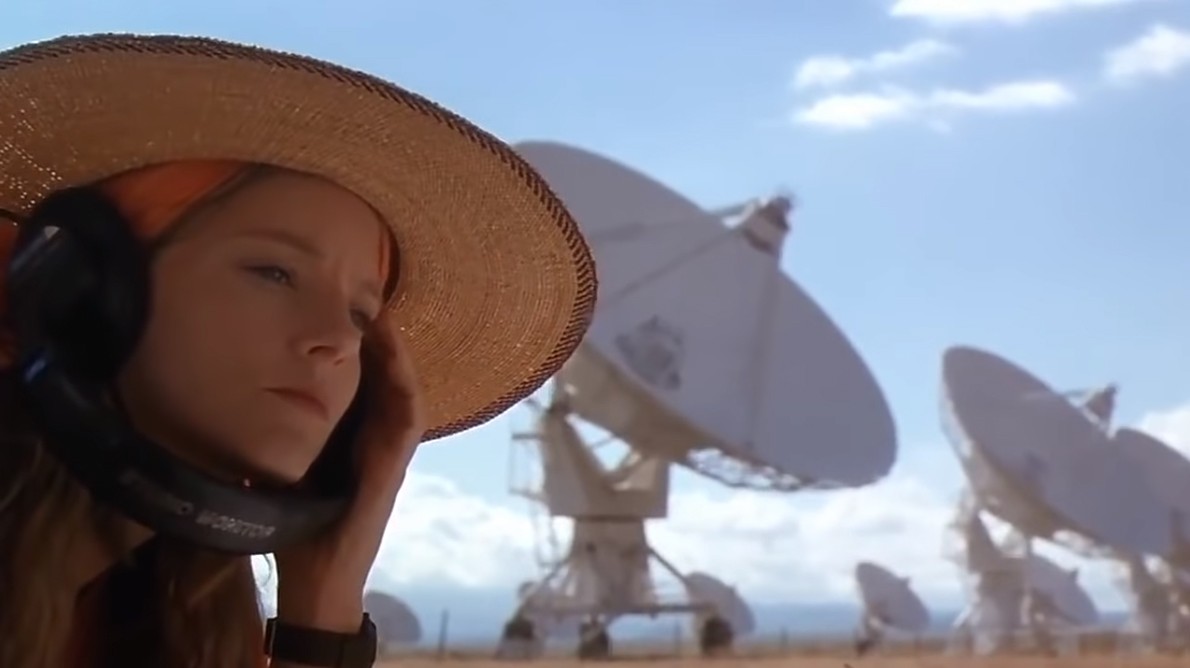
I sat down to watch the 1997 film again—I think the last time I saw it, I was thirteen—to find out if it still held up to memory. Contact features courageous and idealistic astronomer Ellie Arroway (Jodie Foster) as its protagonist, and the plot of the film can be summarized in one sentence: Girl has a dream about understanding the universe; girl builds a wormhole to figure it out. Contact only asks us to accept a single implausible event as its premise: that we are not alone in the universe. Instead of receiving an indecipherable “gravity equation” that requires the reconciling of quantum mechanics with quantum gravity to make sense like Brand does in Interstellar, Ellie receives a signal from the star Vega that contains prime numbers, and encoded in the signal, the schematics of a machine that can transport a single person to its origin. The technobabble sleight of hand ends there: the only other ask is that we think like the Vegans (translating the schematics requires folding it up into three dimensions) and that we believe human beings are capable of working together to build the most expensive science project in history.
Interstellar and Contact both run parallel with a father/daughter relationship that serves as a crucible for questions of love, truth, and faith in a really big and lonely universe. And of course, both feature wormholes. As one film critic notes in his unhappy review of Interstellar, both movies even share a gift-giving gesture (the watch in Interstellar, the compass in Contact) that’s responsible for saving the protagonist’s life. Where the two diverge, however, is in where they go from there, and I don’t mean physically.
In Interstellar, the main concern is time: there’s never enough of it, on this world or the next. We can’t linger in any one place too long, cinematically or emotionally. We never get to learn much about the Endurance’s crew: Amelia, Romilly (David Gyasi), and Doyle (Wes Bentley) barely have any conversations together that don’t involve near-death breathlessness. Human relationships in Interstellar are as stretched out and flat as Gargantua’s event horizon, whereas Contact, to cite one example, provides a supporting character Kent Clark (William Fitchner) whose loyalty to Ellie is expressed by his ability to share her vision when others can’t: he’s physically blind, not to mention that his enhanced hearing ability as a result of his blindness is instrumental in discovering breakthroughs in decoding the alien signal.
In Contact, the main concern is space—both physically and metaphorically. Ellie’s mother dies before she’s born, and her father teaches her how to connect with other people through technology, first through CB radio and later through stargazing. When she loses him to a heart infarction as a little girl, Ellie finds herself alone in the universe despite being surrounded by people throughout the trajectory of her prestigious career. Ellie’s lifelong search for extraterrestrial life in the SETI program becomes a metaphor for her loneliness, and her fear that without a confirmation that there are others out there like us, she’ll never be able to achieve a sense of purpose and belonging within herself. We see this manifest in Ellie’s resistance to falling in love with Christian philosopher Palmer Joss (McConaughey). As a little girl, her father tells her that despite the power of technology to bridge the gap between people, it can’t allow her to communicate with the mother she’s never met, but longs to know. Love, we learn, is a force of longing that transcends space and time, despite our human limitations: at the end of the film, the wormhole alien (taking the form of Ellie’s father) tells her, “You see, in all our searching, the only thing that makes the emptiness bearable is each other.”
The Nolans have the same ambitions with Interstellar: to portray love as a “higher dimensional” force that bleeds through dimensions like gravity. But in Interstellar, all the moves are literal. Cooper and Murphy are literally separated by time and space. The “force of love” that saves the day and masquerades as gravity turns out to be, literally and in Morse code, the handiwork of Cooper in a black hole tesseract behind the bookshelf. The gift of the watch, instead of standing in for the burden of love or the fear of accepting that burden as it does in Contact with the compass, literally is the object that contains the McGuffin of Interstellar. The big hulking machinery that is Interstellar, like a shiny rampaging TARS robot, insists on hitting us over the head with all the weight of its technological prowess, while McConaughey’s Palmer Joss, in the parallel universe that is Contact, cautions us that “we’ve lost our sense of direction,” our sense of self, in the pursuit of technology: The search for truth, it turns out, is just as much within us as it is without.
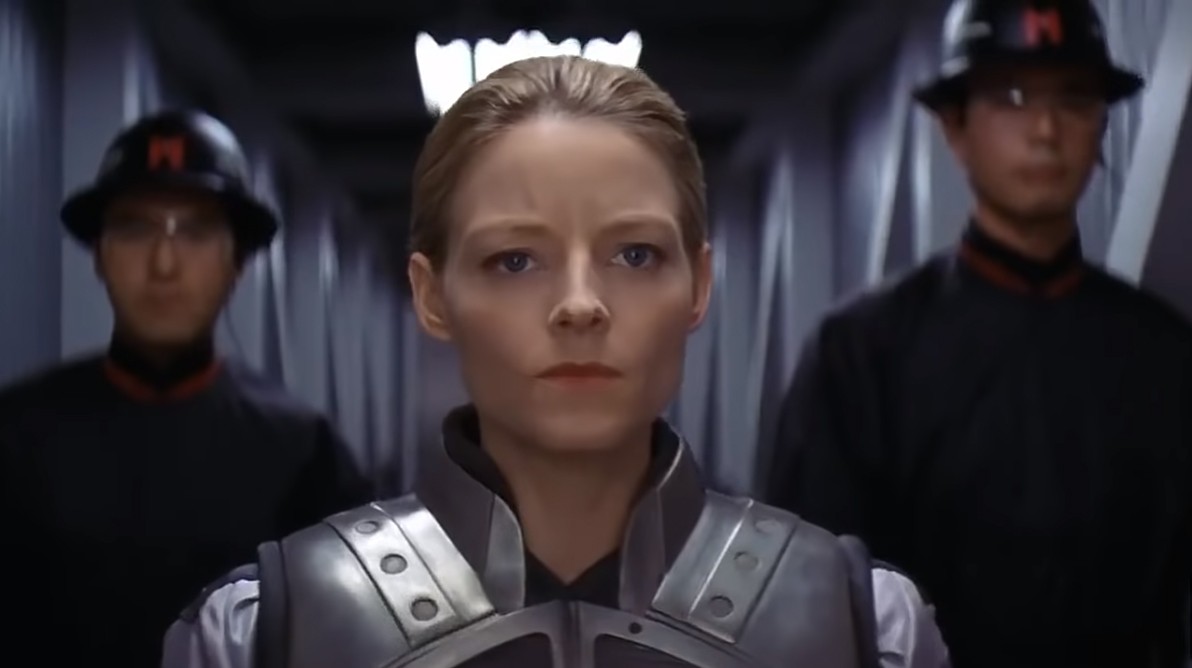
What we get at the end of Contact isn’t a clumsy speech about the scientific basis for love as delivered by a flimsy scientist caricature (Amelia) just to explain character motivations: instead, Ellie’s attempt to express what she’s experienced is the genuinely frustrated beliefs of a heroine whose words are movingly honest and straightforward, simultaneously a failure and triumph to prove that what she experienced is the affirmation of her existence by an Other; love itself:
I had… an experience. I can’t prove it. I can’t even explain it. All I can tell you is that everything I know as a human being, everything I am—tells me that it was real. I was given something wonderful. Something that changed me. A vision of the universe that made it overwhelmingly clear just how tiny and insignificant—and at the same time how rare and precious we all are. A vision… that tells us we belong to something greater than ourselves… that we’re not—that none of us—is alone.
The mystery and anticipation of wonder in Contact hinges on that single idea—again, what it would mean, scientifically, philosophically, spiritually, if we were to discover that we’re not alone in the universe—the gravity of which Interstellar takes for granted at the beginning of the film, and dismisses by the end as mere far-future human ingenuity; amounting, ultimately, to self-indulgence on the cosmic scale. That’s why I, for one, would rather “go” nowhere with Jodie Foster, but discover everything of human value in the process.
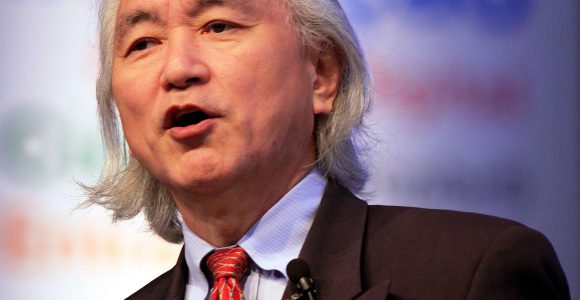
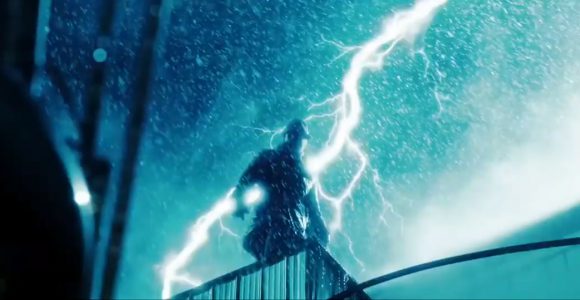
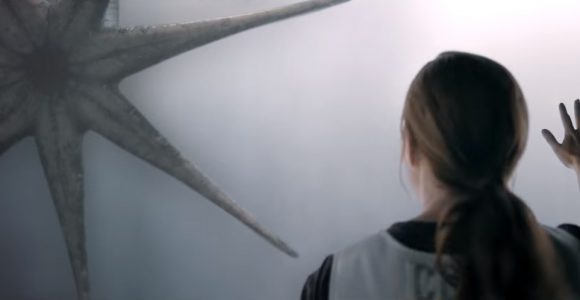

Comments on Interstellar vs. Contact: Questions of Love in Five Dimensions
Toby
Hey Dquinn,
Interstellar aside, I feel exactly the same feel of hopelessness about new movies never matching the thrill and wonder of, say, Jurassic Park. Would you mind naming some others that have given you that experience? I’m genuinely intrigued!
Daniel Quinn
What an interesting question. Here’s a quick list of the movies that made me feel alive rather than dead, which is how I usually feel. They are mostly fantasies. I have left off the obvious ones (like the original Star Wars trilogy, the Princess Bride, the Matrix I, or Lord of the Rings). In no particular order:
– The Neverending Story; x1000
– Pan’s Labyrinth; heartbreaking, also del Toro’s art is awesome
– Dragonheart; best dragon movie ever
– Dark City; scifi noir I can never get over
– The Animatrix; what the Matrix sequels should have been!
– Children of Men; also heartbreaking
– Sky Captain and the World of Tomorrow; hokey but I love it, it’s got this wonderful retrofuturist nostalgia
– Tree of Life; and its counterpart, Melancholia, both worth seeing
– The Fifth Element; quintessential space opera
– Stardust; tons of CG wizardry for the D&Der still in your heart
– Bridge to Terabithia; I remember this being sad but also great
– Ghost in the Shell: Innocence; my favorite of the Ghost series, has a spiritual machine edge to it
– The Fall; I vaguely remember this but it’s great storytelling
– Toys; that final battle with the old toys still makes me smile
That’s all I can think of off the top of my head!
Daniel Quinn
Oh oh, and Another Earth and The Sound of My Voice. Both Brit Marling, but they were lovely, haunting movies.
JB
Hello Daniel,
You’ve made some very astute observations.
I think I can unravel the many mysteries surrounding “Interstellar” – and in doing so explain why it failed to deliver on its promise.
I’m the “JB” of the story I am about to share. I need to remain anonymous for reasons that will become obvious if you read my husband “RM”‘s very recent posts at slashfilm.com under the interview with Jonathan Nolan. – We are working behind the scenes to expose the heavy-hitters in Hollywood for their penchant for plagiarism.
This issue is bigger than any one person, and it deserves its Hannibal Buress moment. – If you don’t already know, he is the black comedian who was brave enough to expose Bill Cosby’s history of sexual assaults on unsuspecting women – creating a meme that forced the issue to finally be addressed by the mainstream media and the man himself. (After decades of “those in the know” enabling him and/or looking the other way.)
I’m hoping that by sharing this story with a few fearless truth-speakers who have no personal tie to the issue, but are simply willing to examine the historical facts, the story can take on a life of its own – and as a result, exposed these people for their fraud, idea-theft and chicanery. The ultimate goal being to force a change in current laws which are clearly stacked in favor of Hollywood theft.
I’d rather expose the history of Hollywood’s best kept secret anonymously, for everyone’s sake, instead of seeking personal gain in a public fight with these unscrupulous people.
I’m not sure if I can post links here, but I’ll try:
Below is a direct link to RM’s comments at slashfilm (see 2 posts and an add-on reply):
(Sort by newest and they’ll be at the top – unless or until they get deleted, like most of his other public comments meant to expose this story, dating back to 2008, before the film was made.)
http://www.slashfilm.com/jonathan-nolan-interstellar-interview/
Scroll down on this web page, to the article below this quote: “The only ‘ism’ Hollywood believes in is plagiarism.”
http://www.weirdwildrealm.com/hollywoodplagiarism.html
On Steven Spielberg & Plagiarism (this will blow your mind) – btw, every site he has ever attempted to paste this link on winds up removing his comment, and at times even the entire comment thread http://www.weirdwildrealm.com/f-amistad-plagiarist.html
Thanks for listening.
Daniel Quinn
Interesting, I will take a look!
Antonio
Daniel Quinn, have a watch (can you say that?) at The Fountain (2007) and tell me if you found it worth it. (Just a recommendation.)
Ah, and Gattaca of course… that’s some really good sci-fi flick.
Daniel Quinn
The Fountain had some really amazing visuals, but unlike Aronofsky’s Pi, I kind of hated The Fountain… it seemed too pretentious for me, and the protagonist’s wife came across as helpless and infantile.
Antonio Tavanti
Yes, it is somewhat pretentious. But there’s something to it that made me like it, maybe *SPOILER* the overall depressing tone of fatal loss *SPOILER* mixed with the bizarre fantasy script. Or maybe the camera work, which adds to the oniric atmosphere already set by the visuals. They managed to turn a not-so-good idea (as it’s the whole *SPOILER* immortality tree *SPOILER* thing, if you think about it) into something peculiar.
Also, it kind of feels very human in all of its three “dimensions” (whatever they are, because in all honesty, having read no reviews or synopsis, I didn’t really get at first that *SPOILER* the space scenes were supposed to be set in our future, and not in some imaginary dimension *SPOILER*).
Maybe I liked it only because it came quite unexpected and I didn’t have much hype about Aronofsky’s works.
Anyway, that was just a recommendation in case you hadn’t seen it. I don’t think it’s a favorite of mine either (should watch it again) and have another list of good sci-fi flicks I like.
I’ll try another couple, again not my favorite but checking if I can find something you haven’t seen and may be worth a try:
– Cube and Cypher by the same director (the latter of the two is less famous), and the more recent
– Moon, by Bowie’s son (a good movie, all considered).
Cheers
Daniel Quinn
Actually that’s pretty spot on–those are all things I liked about it too. I haven’t seen Cube & Cypher so I will check that out. However, Moon is excellent. That’s definitely up there on my A list. I had no idea Bowie’s son was the director!
Aditya
Hey Daniel, no offence but Rustin Cohle was way better and kickass than Cooper.
Nolan has literally wasted Matthew McConaughey :\
Daniel Quinn
I agree with you 100%!